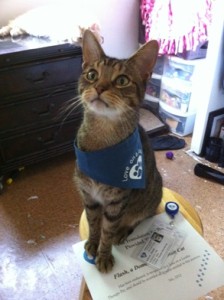The myth of the crazy cat lady – cats as therapists
It’s something that’s featured in so many things as a long running joke; the American sitcom “Rules of Engagement” has a tapdancing, socially awkward character called Liz who surrounds herself with feline family members. The Simpsons has the lady who shuffles about in her dressing gown hurling cats at passers by.
But there’s something that’s never hit upon while this cliché is being repeatedly used for humorous effect; it’s a scientifically, medically proven fact that cats have been known to assist peoples mental health.
Many studies have found that the company of a cat can lower blood pressure and reduce stress. When a cat is stroked, the hormone Oxytocin is released and triggers feelings of love, trust and connectivity. It’s been established that people who are suffering from depression have responded positively to a “therapy cat” to interact with because of the hormone previously mentioned.
Cats have been reported as helping people to overcome loss too; a UK study discovered that recently widowed individuals who cared for a cat were less likely to exhibit physical symptoms of grief, such as crying.
And a Miami University study illustrated results that established cat carers are less likely to feel lonely that people who don’t share their home with a feline, this is believed to be because the cat in their life offers them social support.
What’s been established from various studies is this; caring for a cat can be hugely beneficial for people who share their home with them. And the love the cat receives from the relationship with their human means that the benefit is reciprocated.
Flash the therapy cat, who works for Love on a Leash.

